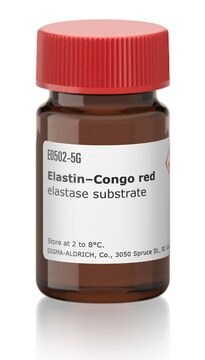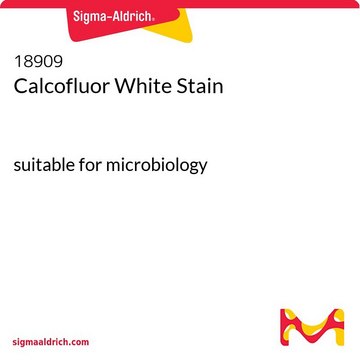C6277
Congo Red
Dye content, ≥85%, certified by the Biological Stain Commission, powder
Sinónimos:
Congo Red 4B, Cosmos Red, Cotton Red B, Cotton Red C, Direct Red 28, Direct Red R, Direct Red Y
About This Item
Productos recomendados
Nombre del producto
Congo Red, BioXtra, certified by the BSC, certified by the Biological Stain Commission
grade
certified by the Biological Stain Commission
agency
certified by the BSC
product line
BioXtra
form
powder
composition
Dye content, ≥85%
technique(s)
microbe id | staining: suitable
mp
>360 °C (lit.)
solubility
H2O: 10 mg/mL
application(s)
diagnostic assay manufacturing
hematology
histology
storage temp.
room temp
SMILES string
[Na+].[Na+].Nc1c(cc(c2ccccc12)S([O-])(=O)=O)\N=N\c3ccc(cc3)-c4ccc(cc4)\N=N\c5cc(c6ccccc6c5N)S([O-])(=O)=O
InChI
1S/C32H24N6O6S2.2Na/c33-31-25-7-3-1-5-23(25)29(45(39,40)41)17-27(31)37-35-21-13-9-19(10-14-21)20-11-15-22(16-12-20)36-38-28-18-30(46(42,43)44)24-6-2-4-8-26(24)32(28)34;;/h1-18H,33-34H2,(H,39,40,41)(H,42,43,44);;/q;2*+1/p-2/b37-35+,38-36+;;
InChI key
IQFVPQOLBLOTPF-HKXUKFGYSA-L
¿Está buscando productos similares? Visita Guía de comparación de productos
Application
Biochem/physiol Actions
Suitability
signalword
Danger
hcodes
Hazard Classifications
Carc. 1B - Repr. 2
Storage Class
6.1C - Combustible acute toxic Cat.3 / toxic compounds or compounds which causing chronic effects
wgk_germany
WGK 3
ppe
Eyeshields, Gloves, type P3 (EN 143) respirator cartridges
Elija entre una de las versiones más recientes:
¿Ya tiene este producto?
Encuentre la documentación para los productos que ha comprado recientemente en la Biblioteca de documentos.
Nuestro equipo de científicos tiene experiencia en todas las áreas de investigación: Ciencias de la vida, Ciencia de los materiales, Síntesis química, Cromatografía, Analítica y muchas otras.
Póngase en contacto con el Servicio técnico








